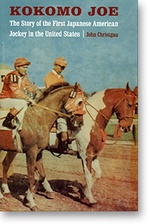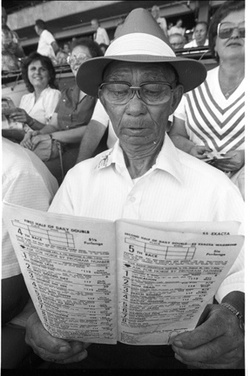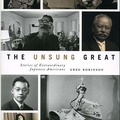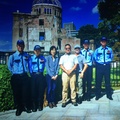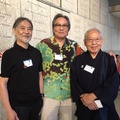“What initially catches my interest in any story is the story itself—its characters, its setting, its suspense and drama, its connection to events that are much larger than the story,” says author John Christgau.
“But the role of the pioneer in sports history—his creativity and determination—is one of the consistent elements in the stories I have chosen to tell.”
In his critically praised new non-fiction book, Kokomo Joe: The Story of the First Japanese American Jockey in the United States , Christgau chronicles the life of Yoshio “Kokomo Joe” Kobuki. Against considerable odds, Kobuki rose from stable boy to star jockey during an era when racial barriers prevented many non-Caucasians from entering professional horse racing.
The jockey’s groundbreaking career reached its zenith just before the bombing of Pearl Harbor in 1941. Amid the national chaos that followed, Kobuki—along with thousands of other Japanese Americans—was swept into a frenzy of anti-Japanese public sentiment.
Kobuki’s aspirations of success and self-betterment were in many ways the classic American dream. But they ultimately were overwhelmed by more powerful forces—and misfortunes—that were beyond his control. Both tragic and inspiring, Kobuki’s journey revealed a side of sports history in the United States that is seldom seen.
“I stumbled across Kokomo Joe’s story in 2003 while interviewing 85-year-old ex-jockey Junior Nicholson at Pleasanton Race Track in the Bay Area,” says Christgau. “During the interview, Nicholson mentioned almost in passing that he had been in the jockey’s room at Caliente Race Track on December 7, 1941, when Kokomo Joe had fled to the border to avoid arrest by Mexican authorities. ‘We never saw Kokomo Joe again,’ Nicholson said.”
“At the time, I filed that story tidbit away as a possible book project I would undertake, if I could uncover the details of Kokomo Joe’s life,” Christgau recalls.
“I began the research and interviewing in 2006,” says Christgau. “It meant weeks of reviewing microfilm of racing stories, and racing results, from newspapers in Northern California. I also was able to get access to documents in a racing history library at Bay Meadows Race Track.”
“The most memorable discovery during that research was news of Kobuki’s record-setting performance at the Humboldt County Fair in August of 1941,” Christgau says. “‘Sweeping the card’ (of five races) at that fair was a remarkable feat, and at the time a modern North American record.”
“Reconstructing Kobuki’s life in horse racing was easy,” says Christgau. “Having already written about the WWII Alien Enemy Control Program, as well as Japanese American relocation and internment, I had researched enough of that history to write about how it affected Kokomo Joe.”
In contrast, unearthing the personal details of Kobuki’s life was more challenging. “The difficult research was finding out about where Kobuki was born, where he grew up, and what he did after his career as a jockey. My search for surviving family members met several dead ends. Then, with the help of a genealogical expert, I found a distant relative of Kobuki’s in Mesquite, Nevada.”
Christgau contacted and interviewed the relative, whose cooperation proved pivotal for the project. “Those interviews in Mesquite led to Kobuki’s racing scrapbook, a family profile, and connections to other family members as well as horse racing friends who could help me fill in the other events of his life.”
“Kokomo Joe’s life seems relevant today on two levels,” Christgau notes. “First, what Kokomo Joe faced in terms of bigotry and racial profiling is the same thing Muslims and Arab Americans faced after 9/11. In WWII, that racism and bigotry was long-standing, but exacerbated by wartime fears and hysteria. America’s suspicion of Muslims, and its anxiety about immigrants in general, were aggravated by tape-loops on TV of panicked people in the streets of New York, fleeing the smoke and destruction of the Twin Towers.”
“What I tried to show, through Kokomo Joe’s life as a jockey, was that the dragnet that eventually caught him had its bureaucratic origins in the fear-driven “Alien Enemies Act,’ which affected one million immigrants—Germans and Italians, as well as Japanese. That Kokomo Joe fought his way through all that fear and bigotry was a mark of his determined character. Today, the Arab American/Muslim community is fighting its way through that same fear and bigotry.”
“Kokomo Joe’s story is also a reminder of the tragedy of unrealized fame,” says Christgau. “Every time I watch American Idol, I am struck by the millions of hopefuls with zero talent who are driven to achieve a fame which they’ll never have. Kokomo Joe had talent and would have been an icon of sorts. But that fame and success were taken from him by our own government.”
While Christgau, a retired English instructor, recognizes the academic value of bringing untold history to light, he also empathizes with Kobuki’s perseverance.
“My books are not so much theme-driven as they are character-driven,” says Christgau. “The people I’ve written about—Kokomo Joe, Albert Siler, Marques Haynes, and Ermer Robinson [Tricksters in the Madhouse: Lakers vs. Globetrotters, 1948 ]—are all interesting people to me because of the mashup (that’s a new word I learned from my journalist daughter the other day) of ambition and goodness that each of them had in their character.”
“Once, at a book signing, I had a question from the audience about where I had learned to write. After thanking the questioner for implying that I could write, I asked all my students in the audience to stand up. About a dozen stood, and I thanked them for being the ones who really taught me how to write. I did not explain how they had taught me, but I should have. They taught me, most of all, that good writing is the result not of sudden inspiration or enlightening lectures, but of endurance and patience. They taught me that you keep plugging away at it, revising and revising, no matter how bad it seems to be, or is. They taught me, and still teach me through their e-mails, that there is nothing better in this world than the right word and a perfectly crafted sentence.”
* Visit John Christgau’s Web site: http://www.johnchristgau.com
© 2009 Japanese American National Museum


